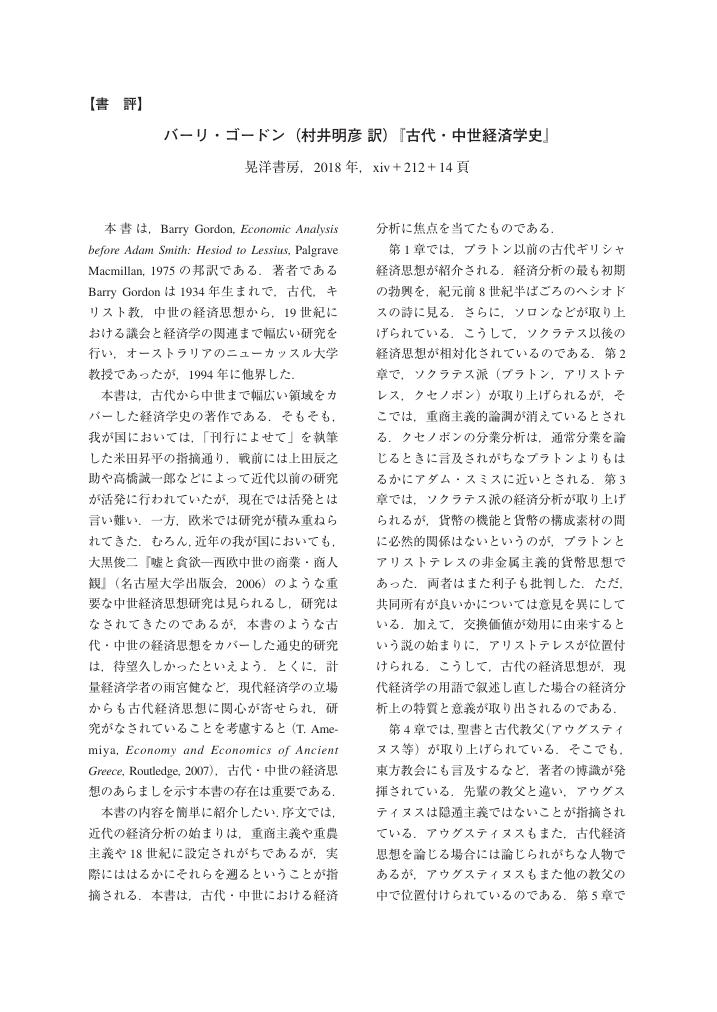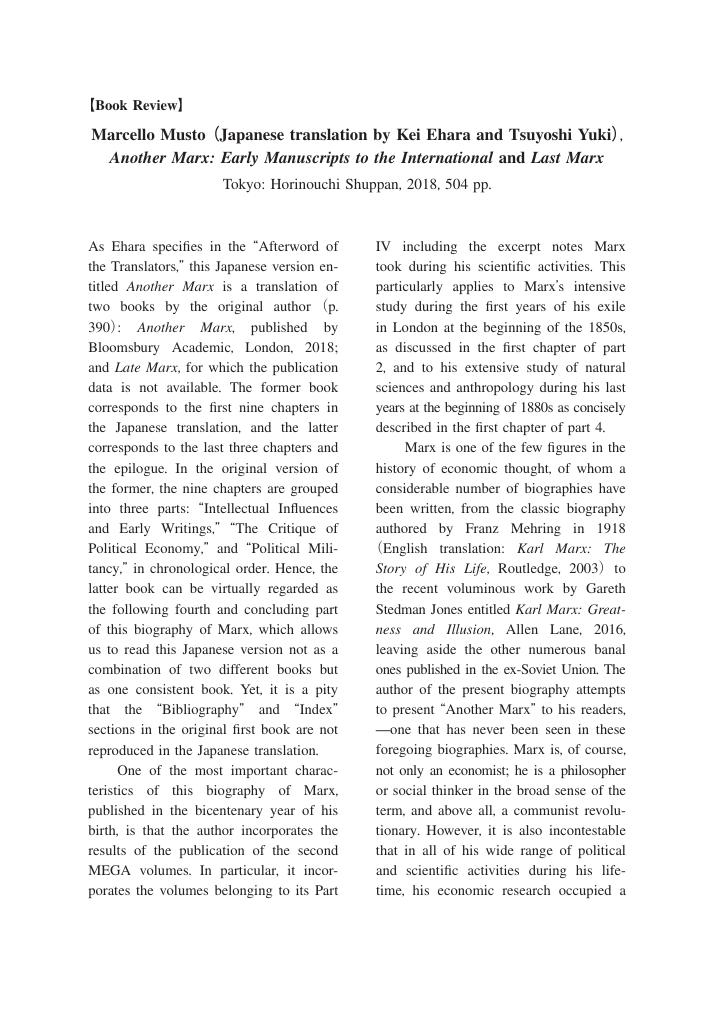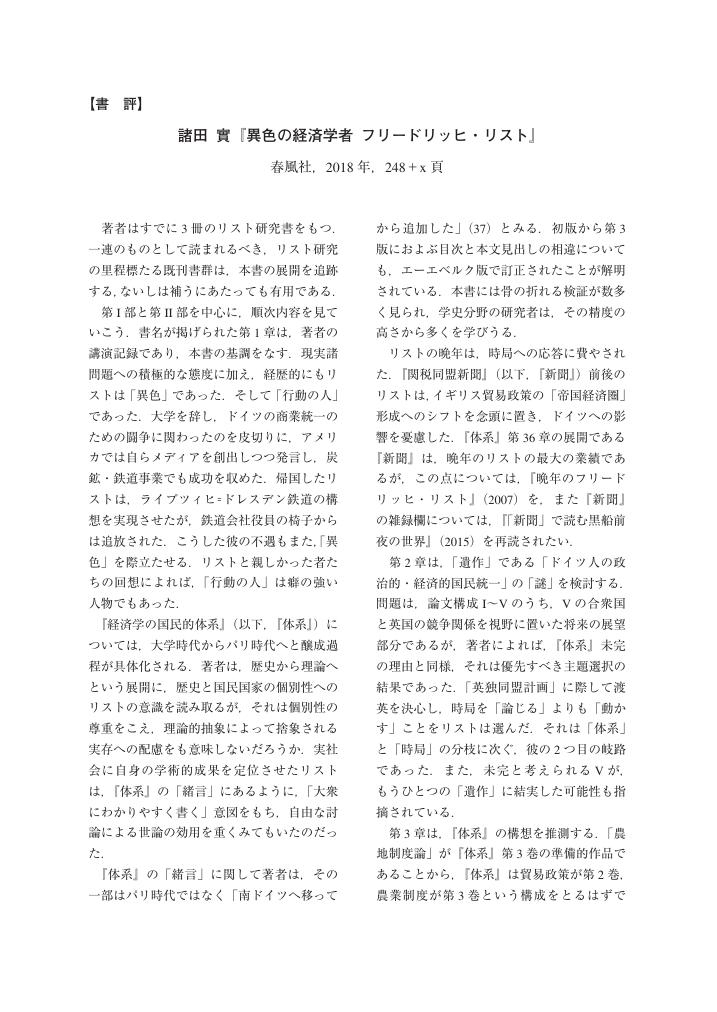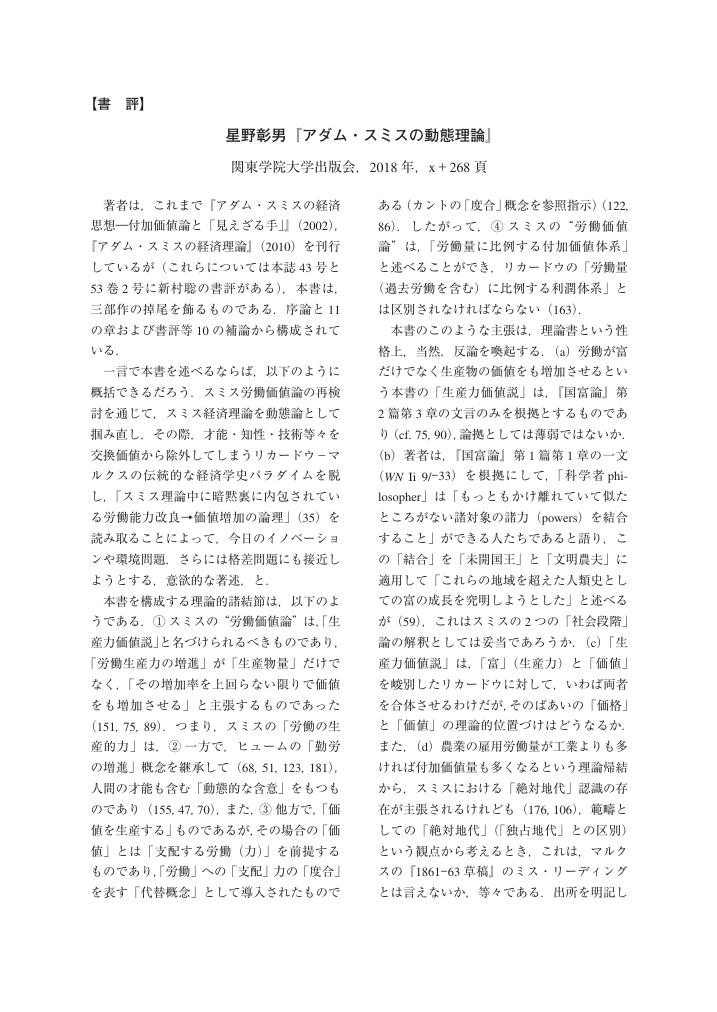- 著者
- 中村 隆之
- 出版者
- 経済学史学会
- 雑誌
- 経済学史研究 (ISSN:18803164)
- 巻号頁・発行日
- vol.62, no.2, pp.102-103, 2020 (Released:2021-12-19)
1 0 0 0 OA LSE 社会学と J. A. シュンペーターの経済発展理論
- 著者
- 小林 大州介
- 出版者
- 経済学史学会
- 雑誌
- 経済学史研究 (ISSN:18803164)
- 巻号頁・発行日
- vol.62, no.2, pp.1-25, 2020 (Released:2021-08-27)
In this paper, the author examines the contents of lectures given by A. C. Haddon, E. Westermarck, and Sydney Webb that Schumpeter attended at the London School of Eco-nomics (LSE) in 1907. This paper uses as references the syllabus of the LSE at that time and written works by the lecturers. Most research on the sources of Schumpeterʼs ideas on economic development and socioeconomics has been conducted based on discussions of Marxist economic thought, the German historical school, and American economists. Little attention has been accorded to the LSE lectures attended by Schumpeter. Consequently, essential parts of Schumpeterʼs history of economic thought have been ignored. This paper addresses that deficit. It has been established that Schumpeter attended lectures at the LSE on ethnology and sociology given by, respectively, Haddon and Westermarck. However, Schumpeter not-ed in a footnote in his posthumous History of Economic Analysis that he also attended Webbʼs lectures on “methods of social investigation.” The present author has previously demonstrated that the LSE lectures delivered by Haddon and Westermarck may have enabled Schumpeter to overcome outmoded ideas of “evolutionism” (which assumed autonomous development and unilineal developmental stages derived from the Enlightenment) and thoughts of “natural law.” Close examination of the lectures delivered at the LSE support the authorʼs previous hypothesis. Further, that examination reveals that Webbʼs lectures delivered in October 1907 could have exerted a defining impact on Schumpeterʼs thoughts on economics. For example, in Webbʼs lecture plans, such items as “The great man as a ferment” and “Possibility of predicting effects of a given social environment on average humans in the immediate future” can be found. Those lectures at the LSE include many key points related to Schumpeterʼs basic as-sumptions about dynamics and economic development. JEL classification numbers: B25, B31, Z13.
- 著者
- 泉 正樹
- 出版者
- 経済学史学会
- 雑誌
- 経済学史研究 (ISSN:18803164)
- 巻号頁・発行日
- vol.62, no.2, pp.69-74, 2020 (Released:2021-12-05)
- 著者
- Taro Hisamatsu Marcelo Fukushima
- 出版者
- 経済学史学会
- 雑誌
- 経済学史研究 (ISSN:18803164)
- 巻号頁・発行日
- vol.62, no.2, pp.75-80, 2020 (Released:2021-12-05)
- 著者
- 若森 章孝
- 出版者
- 経済学史学会
- 雑誌
- 経済学史研究 (ISSN:18803164)
- 巻号頁・発行日
- vol.58, no.2, pp.86-88, 2017
1 0 0 0 エンゲルスの理論活動の意義と問題:没後100年を記念して
- 著者
- 保住 敏彦
- 出版者
- 経済学史学会
- 雑誌
- 経済学史学会年報 (ISSN:04534786)
- 巻号頁・発行日
- vol.33, no.33, pp.39-51, 1995
In this paper, I examine the thoretical works of Friedrich Engels in his youth and later years in order to elucidate the significance and limitation of that work. I have investigated the following: <i>Outlines of a Critique of Political Economy</i>, and <i>The Condition of the Working Class in England</i>, which are early works, and <i>Anti-Dühring</i>, a later work. My research indicates that the young Engels moved from Left-Hegelianism to Communism in 1842, earlier than young Marx, and played an important role in formulating the Materialist Conception of History. The paper traces the development of Marx's ideas as contained in the theory of alienated labour in <i>Economic and Philosophical Manuscript</i> (1844) and compares them to those of the Materialist Conception of History in <i>The German Ideology</i> (1846) by Engels and Marx. Finally it examines Engels' book Anti-Dühring (1885) in order to discover the characteristics of his interpretation of Marxian Theories, and finds his interpretation of history evolutionistic and optimistic.
- 著者
- 深貝 保則
- 出版者
- 経済学史学会
- 雑誌
- 経済学史学会年報 (ISSN:04534786)
- 巻号頁・発行日
- vol.35, no.35, pp.171-173, 1997
1 0 0 0 OBITUARY Mark Blaug (1927-2011)
- 著者
- 原谷 直樹
- 出版者
- 経済学史学会
- 雑誌
- 経済学史研究 (ISSN:18803164)
- 巻号頁・発行日
- vol.56, no.2, pp.122-124, 2015
- 著者
- 松永 友有
- 出版者
- 経済学史学会
- 雑誌
- 経済学史研究 (ISSN:18803164)
- 巻号頁・発行日
- vol.62, no.1, pp.26-50, 2020 (Released:2020-10-16)
John Maynard Keynes is known to have frequently changed his opinion on free trade and protection. There have been two contrasting interpretations of Keynes’s thought on the external economic policy, with one considering him essentially a free trader and the other finding him a protectionist. This article elucidates an original coherent explanation for Keynes’s ambiguous thinking on Britain’s external economic policy by observing the contradictory coexistence of economic nationalism and pacifist free-trade ideology among the New Liberals (left-leaning Liberals), of whom he was one. Since the 19th century, Britain had a peculiar political tradition in that the proposal of a protectionist policy almost entirely came from the political right, whereas the political left monolithically supported unconditional free trade under the influence of Richard Cobden’s idealistic internationalism. New Liberals, such as J.A. Hobson and Keynes, were sympathetic to the vision of a balanced national economy in which the manufacturing, rather than the financial sector, played a central role. In this sense, New Liberals had much in common with the historical economists, such as William Cunningham and William Ashley, who supported the Conservative Party’s protectionist campaign. Both Hobson’s theory of underconsumption and Keynes’s theory of effective demand emphasized the importance of domestic, rather than foreign markets. This meant that the New Liberals’ economic thinking was essentially more congruent with a protectionist policy to safeguard domestic manufacturing industries than free trade. Nevertheless, the New Liberals found it extremely difficult to support a protectionist policy because of protectionism’s strong association with right-wing politics in Britain and its incommensurability with their belief in a pacifist free-trade ideology. This dilemma formed the backdrop of Keynes’s allegedly inconsistent attitudes on the external economic policy of his time. JEL classification numbers: B10, B20, B27.
- 著者
- 星野 彰男
- 出版者
- 経済学史学会
- 雑誌
- 経済学史研究 (ISSN:18803164)
- 巻号頁・発行日
- vol.61, no.2, pp.82-83, 2020 (Released:2020-02-29)
- 著者
- 泉 正樹
- 出版者
- 経済学史学会
- 雑誌
- 経済学史研究 (ISSN:18803164)
- 巻号頁・発行日
- vol.61, no.2, pp.86-87, 2020 (Released:2020-02-29)
- 著者
- 野原 慎司
- 出版者
- 経済学史学会
- 雑誌
- 経済学史研究 (ISSN:18803164)
- 巻号頁・発行日
- vol.61, no.2, pp.88-89, 2020 (Released:2020-02-29)
- 著者
- 仲北浦 淳基
- 出版者
- 経済学史学会
- 雑誌
- 経済学史研究 (ISSN:18803164)
- 巻号頁・発行日
- vol.61, no.2, pp.90-91, 2020 (Released:2020-02-29)
- 著者
- 竹永 進
- 出版者
- 経済学史学会
- 雑誌
- 経済学史研究 (ISSN:18803164)
- 巻号頁・発行日
- vol.61, no.2, pp.92-93, 2020 (Released:2020-02-29)
- 被引用文献数
- 1
1 0 0 0 OA 諸田實『異色の経済学者 フリードリッヒ・リスト』春風社,2018年,248+x 頁
- 著者
- 大塚 雄太
- 出版者
- 経済学史学会
- 雑誌
- 経済学史研究 (ISSN:18803164)
- 巻号頁・発行日
- vol.61, no.2, pp.94-95, 2020 (Released:2020-02-29)
- 著者
- 大槻 忠史
- 出版者
- 経済学史学会
- 雑誌
- 経済学史研究 (ISSN:18803164)
- 巻号頁・発行日
- vol.61, no.2, pp.96-97, 2020 (Released:2020-02-29)
- 著者
- 堂目 卓生
- 出版者
- 経済学史学会
- 雑誌
- 経済学史研究 (ISSN:18803164)
- 巻号頁・発行日
- vol.61, no.2, pp.98-99, 2020 (Released:2020-02-29)
1 0 0 0 OA 星野彰男『アダム・スミスの動態理論』関東学院大学出版会,2018 年,x+268 頁
- 著者
- 佐藤 滋正
- 出版者
- 経済学史学会
- 雑誌
- 経済学史研究 (ISSN:18803164)
- 巻号頁・発行日
- vol.61, no.1, pp.139-140, 2019 (Released:2019-10-14)
1 0 0 0 OA グラスランの累進的消費税論 消費の規範性と担税能力
- 著者
- 山本 栄子
- 出版者
- 経済学史学会
- 雑誌
- 経済学史研究 (ISSN:18803164)
- 巻号頁・発行日
- vol.61, no.1, pp.1-20, 2019 (Released:2019-10-01)
Abstract: This paper discusses Graslin’s progressive consumption tax theory proposed for the reconstruction of tough fiscal conditions in France in 1767. Graslin criticised the single tax on land Physiocrats demanded because it narrowed taxable objects due to the distinction between ‘productive’ and ‘sterile.’ A direct tax on income at a fixed rate is disadvantageous to poor people; in the case of progressive rates, there will be apathy toward economic activity. At that time, it was difficult to estimate individual income or wealth of all classes accurately, including of tax-exempt classes. Therefore, Graslin considered that individual consumption capacity was an indicator of income level. A tax imposed in proportion to consumption capacity and normativeness, namely, the level of items’ importance for survival, would be fair and efficient for an increase in revenue. In Graslin’s progressive consumption tax system, necessities are not taxed; however, the more luxurious the item, the higher the consumption tax. Furthermore, hoping for multiplier effects, Graslin linked the effects of consumption tax and tariffs. While Graslin acknowledged Cantillon’s cycle theory, Graslin noted that Cantillon did not consider tariffs in the downturn of an economic cycle. Although tariffs raised the prices of luxury goods, the government would increase revenue through the consumption tax paid mainly by wealthy people. This logic conforms to the Ramsey rule. For wealthy people, Graslin regarded luxuries to maintain their pride as their necessities. For this reason, he considered luxury goods to have low price elasticity of demand. Thus, wealthy people’s consumption of luxuries would not decrease even if their real income decreased. JEL classification numbers: B11, B31, H22.
1 0 0 0 OA オーストリア資本理論の独自性と多様性 資本機能と企業家の観点から
- 著者
- 赤塚 一範
- 出版者
- 経済学史学会
- 雑誌
- 経済学史研究 (ISSN:18803164)
- 巻号頁・発行日
- vol.61, no.1, pp.21-44, 2019 (Released:2019-10-01)
Abstract: In the real world, an entrepreneur requires capital to produce. Thus, the Austrian school of economics, which theorizes the real economic world as it is, must be based on capital the- ory. This means that distinctive areas of the Austrian school of economics, such as Business Cycle, Economic Calculation, Entrepreneurship, Knowledge, Spontaneous Order, and Market Process must be understood based on capital theory. However, Austrian Capital Theory(ACT)is not a unique theory; rather, it is plural. This plurality makes understanding its diverse roles in Austrian Economics difficult. Examining these plural theories, I find the shared similarity in these theories lies in the viewpoint of an entrepreneur. In the first place, we reveal the plurality of ACT by tracing its genealogy. Next, we classify them using the controversy between Endres & Harper and Braun in the History of Economic Thought(2014). Lastly, I group them into three capital functions by ranking plural concepts of capital alongside a process of change in entrepreneurial asset composition. These functions are ‘production factor,’ ‘purchase,’ and ‘calculation.’ Plural concepts of capital are integrated into the viewpoint of an entrepreneur who uses the three functions to produce in the real world. That is a distinctive feature of ACT, and this also means that ACT and entrepreneurship theory are never isolated. Rather, this distinctiveness becomes one of the sources of its plurality. JEL classification numbers: B13, B25, B41.











